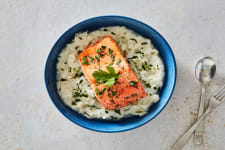If a weight loss plan is part of your overall health journey, enjoying a seafood diet for weight loss can be a great way to effectively manage your weight and support overall health. Eating wild-caught seafood on a regular basis will add protein and beneficial nutrients to your diet, which can support healthy weight loss.
Diet plays a crucial role in healthy lifestyles and although all foods can fit, certain nutrient-dense choices make the job easier (and more delicious). Based on science-backed research, seafood ranks up there as one of the best foods for health, weight maintenance, and weight loss. Plus, focusing on the delicious foods we can add to our diets instead of the foods to avoid can make a weight loss journey more enjoyable and sustainable.
Benefits of Seafood for Weight Loss
Seafood Is High in Protein
Protein plays an important role in helping to achieve this calorie deficit, and many varieties of seafood pack a protein punch. For example, several species of wild-caught seafood provide over 20g of protein per 6 oz. serving. Numerous clinical trials have linked protein intake to increased satiety1, or the feeling of being full, and therefore decreased calorie intake.
And the benefit of protein specifically from fish may have an even greater impact on satiety and its associated calorie deficit. A small study2 looked at calorie intake in participants after either a high protein fish meal or a high protein beef lunch. It concluded that those who had fish as a protein source at lunch consumed 11% less calories at dinner than those who ate the beef lunch.
Seafood Supports Metabolic Health
Numerous clinical trials have linked seafood consumption to improved metabolic health — the overall status of your blood sugar, waist circumference, blood pressure, cholesterol and triglycerides. These factors are associated with healthy weight management, beyond weight loss through a calorie deficit.
A 2017 study that looked at over 20,000 Norwegians found associations between eating both fatty and lean fish and improved metabolic health3 in certain populations. Among other findings, this study concluded that eating a lean species of fish was associated with smaller waist circumference in men and eating fatty fish was associated with reduced triglycerides in women. Although one may be tempted to stick to lean fish as the best fish for dieting, this research supports the consumption of a variety of seafood choices — including “fatty” cold water fish — for improved health and weight loss.
In a 2009 study, aptly named SEAFOODplus4,126 overweight individuals were divided into three different groups, all receiving a 30% calorie-reduced diet. One group received a species of white fish three times a week, and a second group received it 5 times a week. A control group received no seafood throughout the study. While all groups lost weight after 8 weeks, the group consuming fish five times per week lost more weight on average than the three-times-per-week group. Both groups that ate fish lost more weight on average than the control group, suggesting that eating seafood for weight loss can help with more than simply achieving a calorie deficit.
Seafood Is Low in Calories
In general, many fish varieties are low-fat, low-calorie food choices. This nutrient breakdown can be important for weight loss or maintenance for a few reasons, including helping one achieve a calorie deficit.
While many factors influence our ability to lose or maintain our weight, a calorie deficit — where the amount of calories we use is greater than the calories we take in — is key. A few species of lean, wild-caught fish contain less than 100 calories per 6 oz. serving, which is less than half the calories from the same amount of beef or pork. Even fattier fish like sablefish are leaner than many animal protein sources.
Limitations of a Seafood Diet for Weight Loss
Seafood cannot help you reach a weight loss goal on its own, though, and quick fixes should never be the go-to as they can lead to weight fluctuations and frustration over time.
Long-term lifestyle changes, however, can lead to healthy habits and sustainable weight loss and maintenance. A balanced diet, stress reduction, regular exercise and adequate sleep all play vital roles in a healthy lifestyle and need to be addressed to set yourself up for success.
1. https://nutritionj.biomedcentral.com/articles/10.1186/1475-2891-13-97
2. https://www.nature.com/articles/1602397






